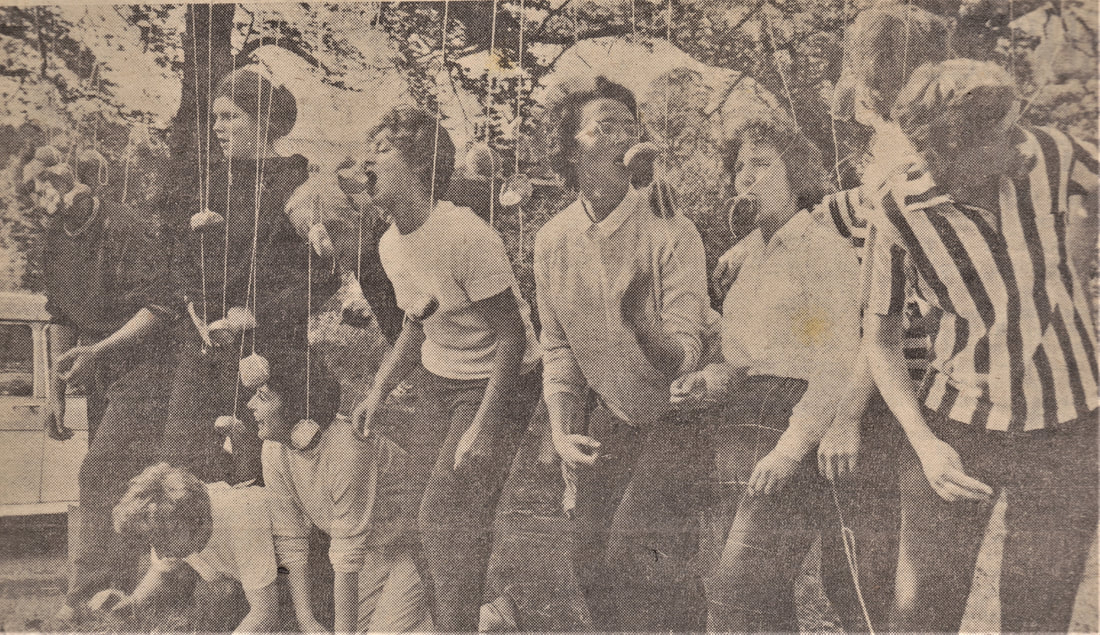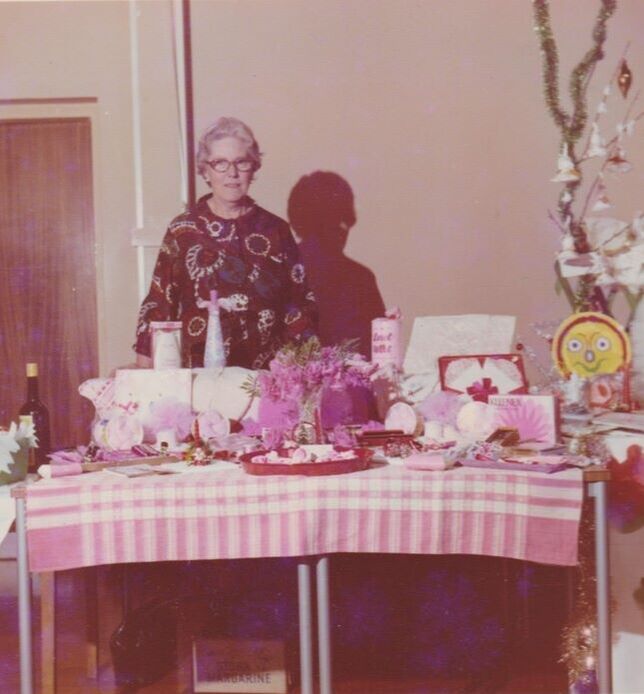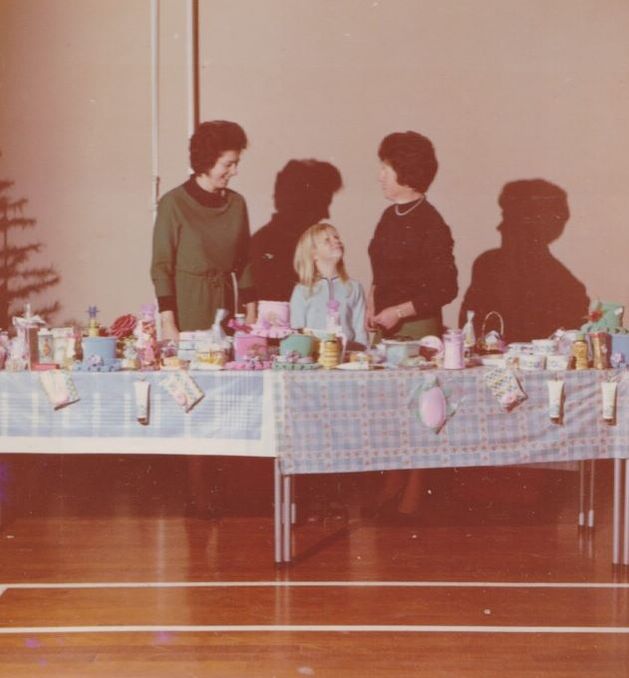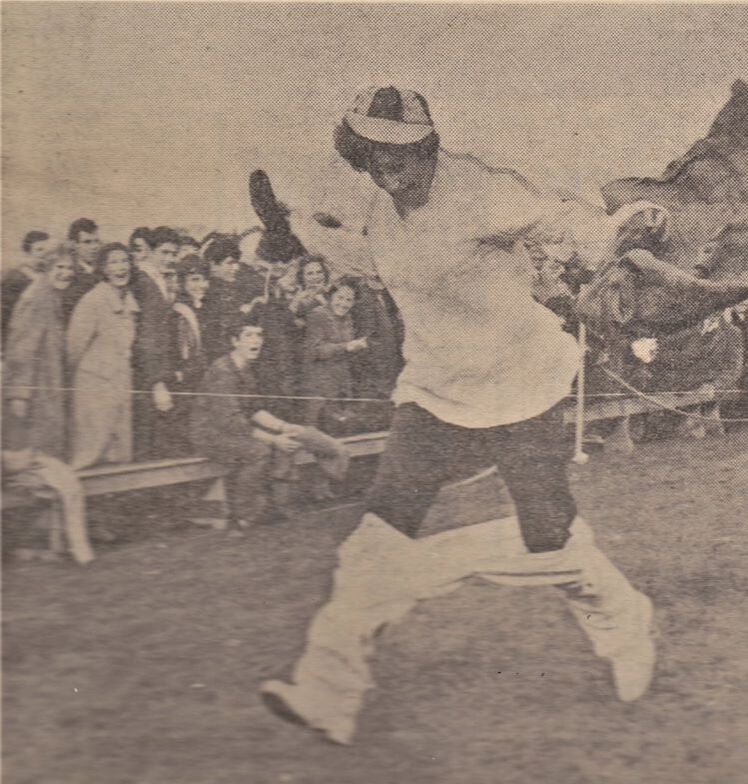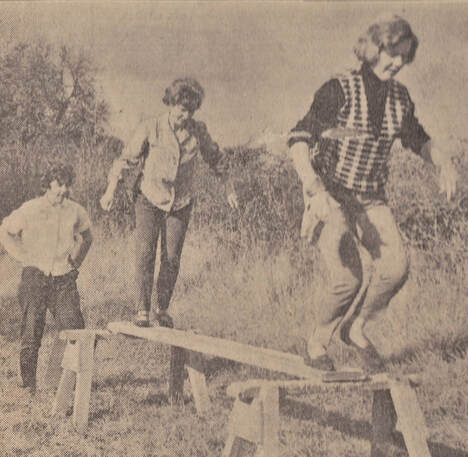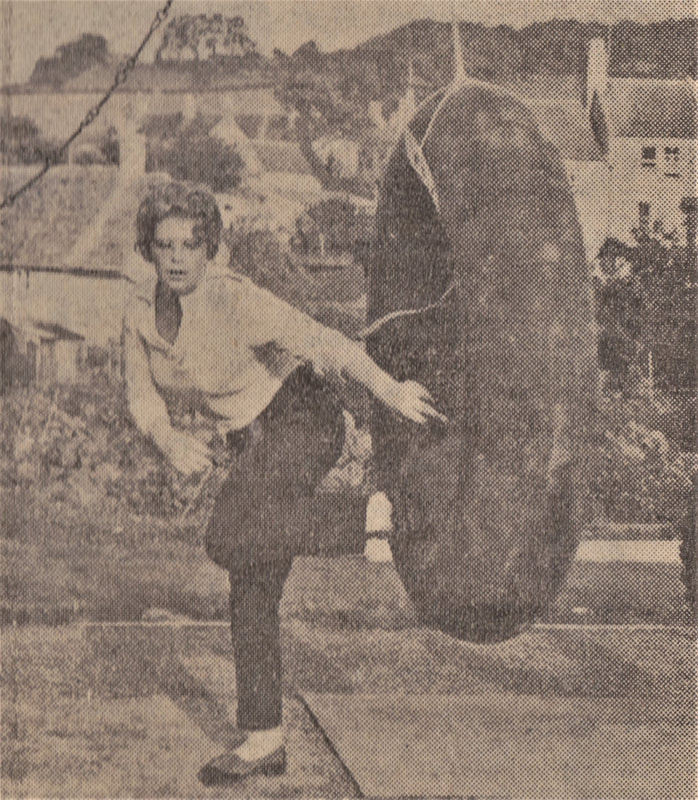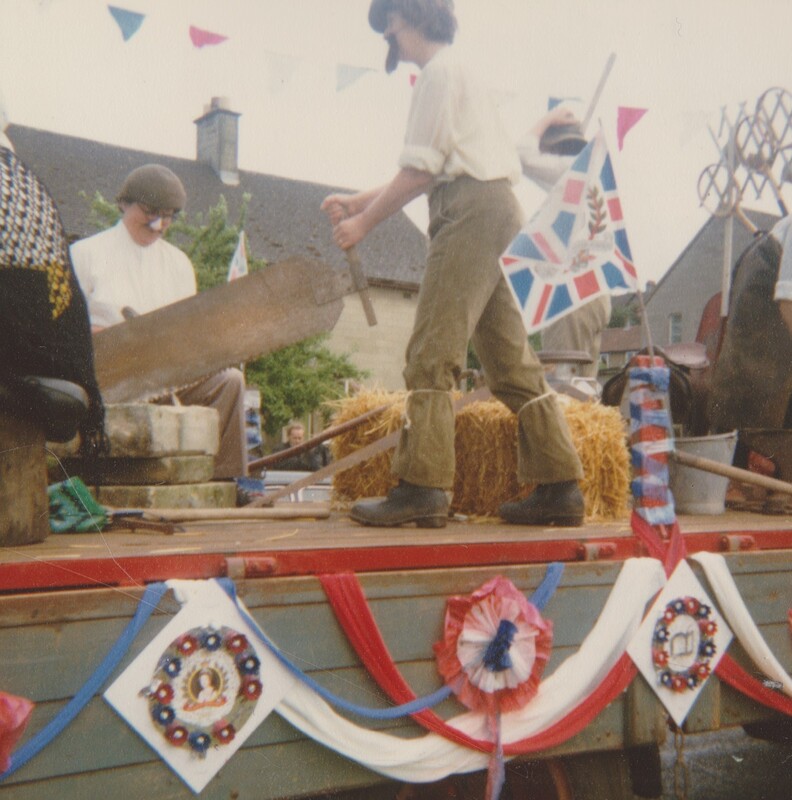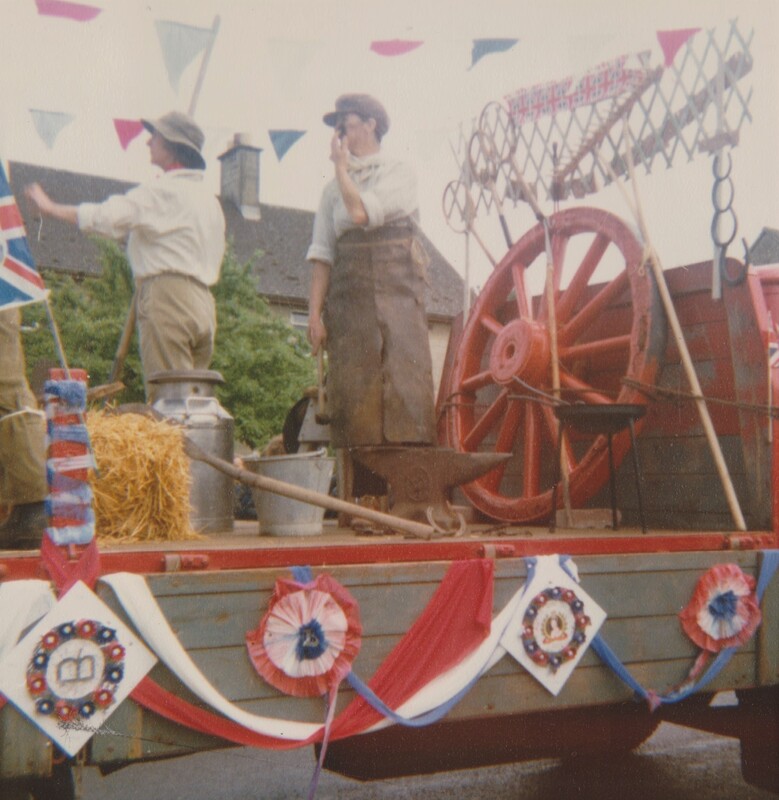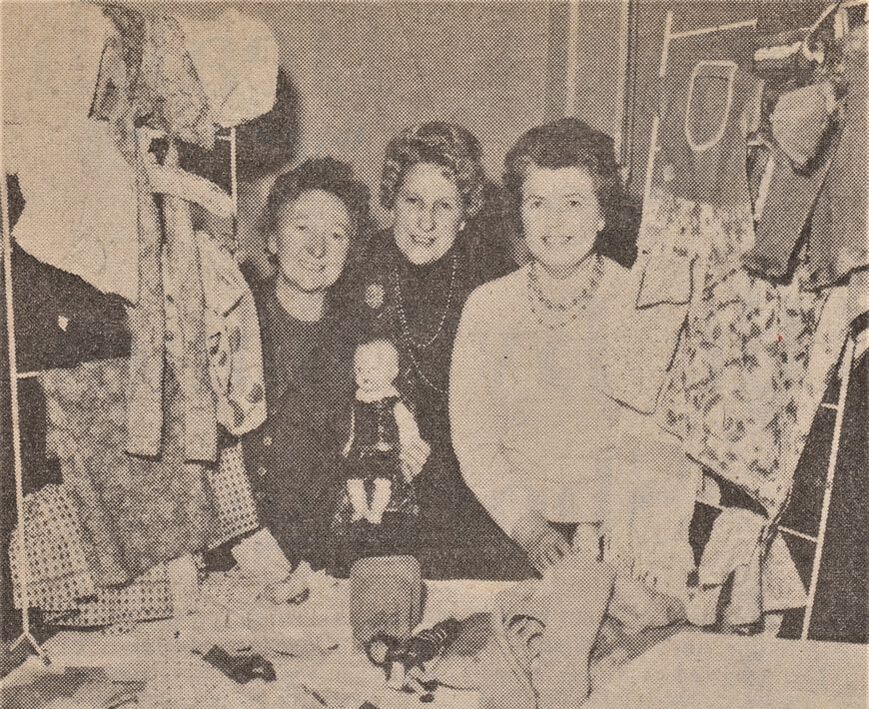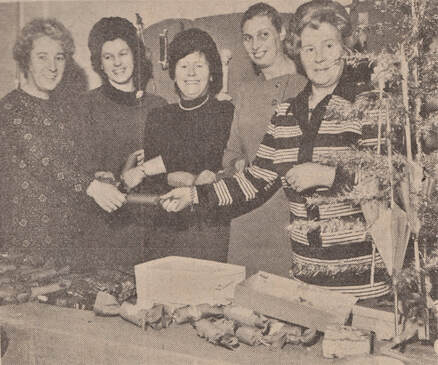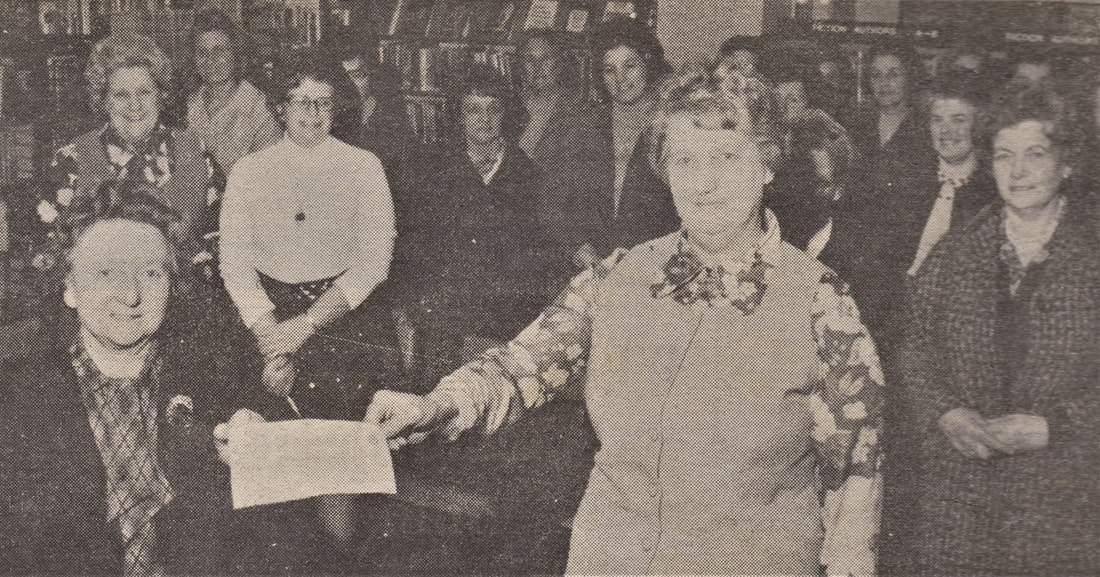Box Ladies Club Alan Payne Research and photos courtesy Joyce Smith January 2020
Clubs and social organisations in Box are nothing new. They provide friendship, support and education for members and add to our community ethos. There were many clubs in late Victorian England, including a Ladies Club in Bath in 1900 appealing for donations towards the Mary Bed on behalf of the Imperial Yeomanry Hospital: “£50 is the necessary sum. Post Orders to Miss Mary Deane, Cheney Court, Box, or Ladies Club, Milsom Street, Bath”.[1] Equally interesting are the reasons that caused the foundation of individual clubs and associations in Box. We can learn much about society in the village from the Box Ladies Club founded in 1962.
Box Ladies Club Founded
The club was founded by young married women of the village, who wanted a new organisation without religious affinity and with a minimum of administration. Madge Best of Bull’s Lane was its chairman for the first five years. Stella Clarke, Gill Banks, Margaret Currant, Liz Porter, Rosa Pletts, Madge Best, Mary Reece, Sybil Best, Mary Gregory, Ruby Eyles, Meg Tanner, Joan Osbourne and Kate Bullock were active in club events. Some of the main aims were to have interesting talks and raise money for local charities. Joyce Smith ran a successful Web Ivory scheme selling products to members and donating the discount to club funds. They were particular supporters of the Shelagh McBrien Heart Unit at Bath Hospital, dedicated to the 19-year old daughter of a Bath doctor who died of a heart attack. Initiatives to raise money included an annual dinner/dance, Summer Fairs, Christmas Bazaars and wine and cheese parties.
Box Ladies Club Founded
The club was founded by young married women of the village, who wanted a new organisation without religious affinity and with a minimum of administration. Madge Best of Bull’s Lane was its chairman for the first five years. Stella Clarke, Gill Banks, Margaret Currant, Liz Porter, Rosa Pletts, Madge Best, Mary Reece, Sybil Best, Mary Gregory, Ruby Eyles, Meg Tanner, Joan Osbourne and Kate Bullock were active in club events. Some of the main aims were to have interesting talks and raise money for local charities. Joyce Smith ran a successful Web Ivory scheme selling products to members and donating the discount to club funds. They were particular supporters of the Shelagh McBrien Heart Unit at Bath Hospital, dedicated to the 19-year old daughter of a Bath doctor who died of a heart attack. Initiatives to raise money included an annual dinner/dance, Summer Fairs, Christmas Bazaars and wine and cheese parties.
Flying High
In May 1966, several club members left Box at 6.20am on a trip to Holland. Air travel was still rare and rather special. On the flight from Lulsgate Airport, Bristol, members were served with coffee and biscuits and free cigarettes to smoke on the journey. The write-up of the event highlighted that Europe was a very different place to Wiltshire. Holland was full of plants and bicycles and the people in Scheveningen ate raw fish! Members also had the pleasure of being given Dutch Gin by their hosts, Clarkson’s One Day Tulip Flight.
The desire for broader information was a key in some of the talks. In 1971 it was Jessica Ayres talking about her time in India; in 1974 a lecture by Dr Wilson, OBE about hospitals in the Gambia, West Africa; and later that year a talk by Mrs Collins about playing bowls for England on a tour of New Zealand. These events were followed by a talk about the Royal Commonwealth Society for the Blind seeking to help six million people around the world, including 4½ million children whose blindness could be cured.
In May 1966, several club members left Box at 6.20am on a trip to Holland. Air travel was still rare and rather special. On the flight from Lulsgate Airport, Bristol, members were served with coffee and biscuits and free cigarettes to smoke on the journey. The write-up of the event highlighted that Europe was a very different place to Wiltshire. Holland was full of plants and bicycles and the people in Scheveningen ate raw fish! Members also had the pleasure of being given Dutch Gin by their hosts, Clarkson’s One Day Tulip Flight.
The desire for broader information was a key in some of the talks. In 1971 it was Jessica Ayres talking about her time in India; in 1974 a lecture by Dr Wilson, OBE about hospitals in the Gambia, West Africa; and later that year a talk by Mrs Collins about playing bowls for England on a tour of New Zealand. These events were followed by a talk about the Royal Commonwealth Society for the Blind seeking to help six million people around the world, including 4½ million children whose blindness could be cured.
|
Pushing the Boundaries
In 1968 members of the club entered the Box Carnival as Adge Cutler and the Worzels, winning first prize in Class 5. It was just the start of some novel ideas. That year thirty members organised a 3-mile walk in the grounds of Hazelbury Manor. The event was promoted as a steeplechase with no horses and was organised in aid of the Selwyn Hall Building Fund. Members were determined to prove they were fitter than the men of the village. Husbands completed the walking course in an hour by avoiding obstacles but Mrs Rita Hughes, using the entry name Romping Rosie, took on the challenge of straw bales, tyre jumps, planks and stopping to eat doughnuts on strings. She completed the course in the amazing time of 41 minutes even though she was a slow doughnut muncher. Right: Romping Rosie puts the men to shame |
Newspaper reports of the event show much about the sexist beliefs of 1960s society that the club were challenging. Rita Hughes was reported as saying afterwards, I suppose I’ll have to get on with the housework now. The cause of equality was still in its infancy, the strike by female workers at Ford’s Dagenham Works had ended in victory in 1968 but women still often had to get signed permission from male partners or father to get bank loans. The male reporter who described the steeplechase couldn’t resist the usual sexist language: Mother of two Mrs Rita Hughes, aged 31 Romping Rosie, appears to enjoy a good canter and later followed by blond Mrs Roma Keogh, aged 27.
The event was a great success and the club followed it with an ambitious fortnightly programme of events in 1970. Talks and trips included the proposed decimal currency, life in Earlstoke prison, and visits to Wills Cigarette Factory.
Political Awakening in 1970s
The club was apolitical but interested in politics in the country at large. In April 1974 Liz Porter organised a trip to the Houses of Parliament at a crucial political time. In the general election a month before, Prime Minister Edward Heath resigned and Harold Wilson attempted to form a minority government. The tone of the election had been vitriolic. Heath posed the definitive question Who Governs Britain? (meaning was it the government or the trades unions) and Enoch Powell quit the Conservative Party because of its advocacy of the European Community. Daniel Awdry, Chippenham Member of Parliament, took them on a tour of the Palace of Westminster, including the Queen’s Robing Room in the House of Lords, the House of Commons and Westminster Hall.
In 1976 Miss Moisey gave a talk about the Probation Service.[2] She spoke about the service in general, the oldest Welfare Service, and new initiatives such as the parole system started in 1971. She challenged accepted views that prostitutes or people with drink problems should be in prison.
Political Awakening in 1970s
The club was apolitical but interested in politics in the country at large. In April 1974 Liz Porter organised a trip to the Houses of Parliament at a crucial political time. In the general election a month before, Prime Minister Edward Heath resigned and Harold Wilson attempted to form a minority government. The tone of the election had been vitriolic. Heath posed the definitive question Who Governs Britain? (meaning was it the government or the trades unions) and Enoch Powell quit the Conservative Party because of its advocacy of the European Community. Daniel Awdry, Chippenham Member of Parliament, took them on a tour of the Palace of Westminster, including the Queen’s Robing Room in the House of Lords, the House of Commons and Westminster Hall.
In 1976 Miss Moisey gave a talk about the Probation Service.[2] She spoke about the service in general, the oldest Welfare Service, and new initiatives such as the parole system started in 1971. She challenged accepted views that prostitutes or people with drink problems should be in prison.
Industry through the Ages, the Jubilee Carnival float June 1977
Silver Jubilee, 1977
Members were active in organising events to celebrate Queen Elizabeth’s Silver Jubilee in 1977. A subscription list was started in the village to fundraise for a local project as a lasting memorial of the jubilee. The funds were spent on the Jubilee Hall in the Market Place which was refurbished and converted into a Youth Centre for voluntary youth organisations and play groups to replace the existing Boys’ Club.[3] The Box Memorial Fund was chaired by Rear-Admiral Desmond Nixon from Ashley.
As well as fundraising, members were active in organising a long weekend of activities in Box: street parties on Friday; sports, exhibitions and a barbeque on Saturday; combined church services on Sunday; and a procession of floats and a Carnival on The Rec on Monday. The Ladies Club float won First Prize in the Box Industries Through the Ages, private club class.
Members were active in organising events to celebrate Queen Elizabeth’s Silver Jubilee in 1977. A subscription list was started in the village to fundraise for a local project as a lasting memorial of the jubilee. The funds were spent on the Jubilee Hall in the Market Place which was refurbished and converted into a Youth Centre for voluntary youth organisations and play groups to replace the existing Boys’ Club.[3] The Box Memorial Fund was chaired by Rear-Admiral Desmond Nixon from Ashley.
As well as fundraising, members were active in organising a long weekend of activities in Box: street parties on Friday; sports, exhibitions and a barbeque on Saturday; combined church services on Sunday; and a procession of floats and a Carnival on The Rec on Monday. The Ladies Club float won First Prize in the Box Industries Through the Ages, private club class.
Club in the 1980s
By the 1980s, society in Box was changing. The original members were aging and, by the 1981, Stella Clarke had performed ten years as chairman and Margaret Currant seven years. Mary Reece undertook the role of treasurer for seven years and Joyce Smith had been active as treasurer, secretary or chairman throughout the club’s history.
Much had changed in the village since the club’s formation. Margaret Thatcher ruled politics for the whole decade; the Cold War with Russia became a hazy memory; monetarism and getting rich became acceptable.
The Box Ladies Club never was a militantly feminist or socially reforming organisation. It simply reflected changes in society in a way that appealed to Box women in the years between the 1960s and 1980s. The cause of equality still remains on the agenda to be achieved but the Box Ladies Club played their part in moving the cause forward.
As our society changes, so have our local clubs and organisations. This was the fate of the Box Ladies Club, who achieved many of their initiatives and had an enormous amount of fun in so doing. They donated the amazing sum of £2,243.76½d (perhaps £20,000 in today’s values) to local charities in the period January 1968 to December 1985. In many respects the club was a considerable success.
By the 1980s, society in Box was changing. The original members were aging and, by the 1981, Stella Clarke had performed ten years as chairman and Margaret Currant seven years. Mary Reece undertook the role of treasurer for seven years and Joyce Smith had been active as treasurer, secretary or chairman throughout the club’s history.
Much had changed in the village since the club’s formation. Margaret Thatcher ruled politics for the whole decade; the Cold War with Russia became a hazy memory; monetarism and getting rich became acceptable.
The Box Ladies Club never was a militantly feminist or socially reforming organisation. It simply reflected changes in society in a way that appealed to Box women in the years between the 1960s and 1980s. The cause of equality still remains on the agenda to be achieved but the Box Ladies Club played their part in moving the cause forward.
As our society changes, so have our local clubs and organisations. This was the fate of the Box Ladies Club, who achieved many of their initiatives and had an enormous amount of fun in so doing. They donated the amazing sum of £2,243.76½d (perhaps £20,000 in today’s values) to local charities in the period January 1968 to December 1985. In many respects the club was a considerable success.
References
[1] Bath Chronicle and Weekly Gazette, 1 February 1900
[2] Parish Magazine, August 1976
[3] Parish Magazine, July 1977
[1] Bath Chronicle and Weekly Gazette, 1 February 1900
[2] Parish Magazine, August 1976
[3] Parish Magazine, July 1977
